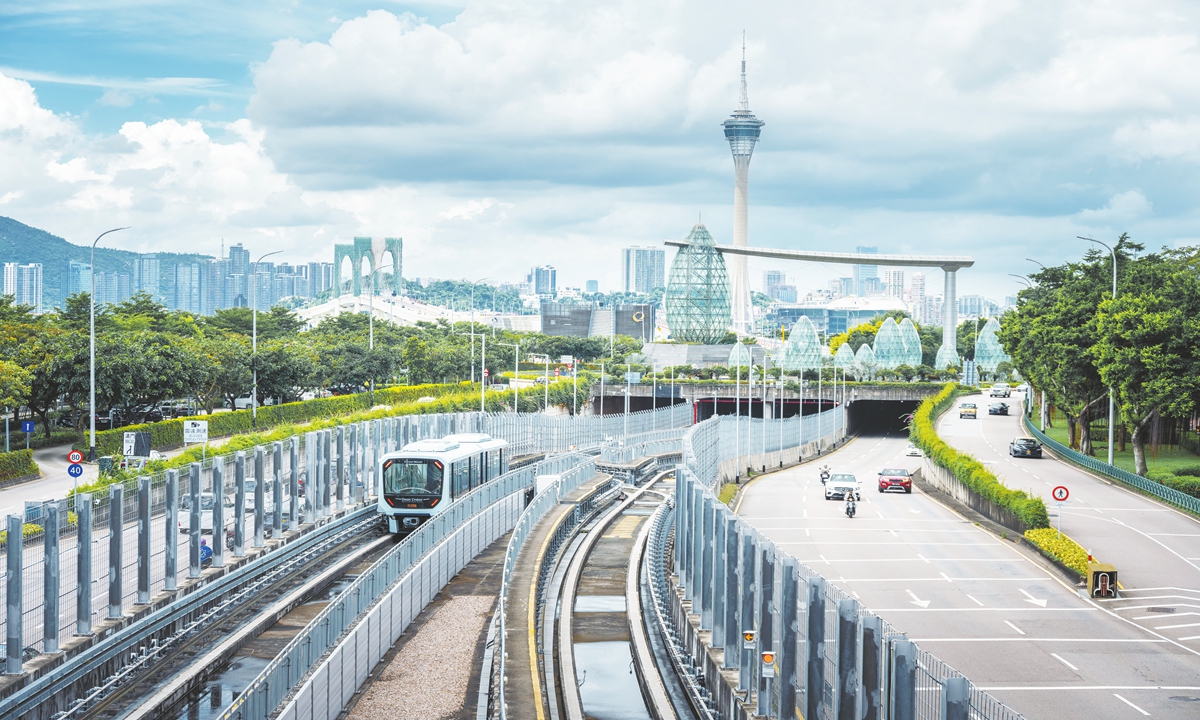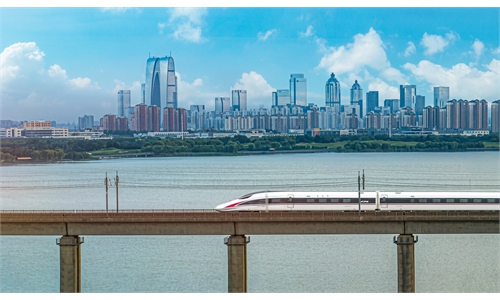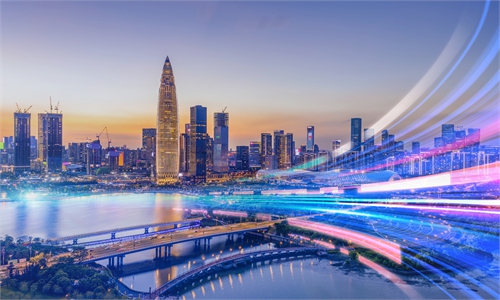Macao’s success contributes to global understanding of Chinese governance wisdom

A light rapid transit train passes through Macao. Photo: VCG
Editor's Note:
As Macao celebrates the 25th anniversary of its return to the motherland, we reflect on the remarkable journey of this unique city under the "one country, two systems" framework. From fostering cultural exchange and economic growth to embracing its role as a bridge between China and the Portuguese-speaking world, today's Macao Special Administrative Region (SAR) exemplifies great resilience and innovation. In a recent interview with Global Times (GT) reporters Lin Xiaoyi and Xia Wenxin, Wu Zhiliang (Wu), president of the Board of Directors of the Macao Foundation, shares his firsthand experiences of Macao's return to the motherland and its extraordinary achievements over the past quarter-century. Wu highlights how Macao has leveraged its unique position in the Guangdong-Hong Kong-Macao Greater Bay Area (GBA), contributing to China's national development while maintaining its cultural characteristics.
GT: You personally witnessed Macao's return to the motherland. Do you still remember how you felt on the day of the handover?
Wu: Attending the handover ceremony between China and Portugal on the evening of December 19, 1999, was undoubtedly one of the most unforgettable moments. Like all Macao residents, I was in tears the moment I saw the five-star red flag being raised at the ceremony. It was a moment the Chinese people had been waiting for many years, a moment of the new life of Macao, as well as an important moment of the rejuvenation of the Chinese nation. That moment will live in history forever.
GT: What do you think the return to the motherland means for Macao?
Wu: The return of Macao, as well as Hong Kong, to the motherland is in fact a major achievement of the reform and opening-up and a key step in putting the concept of "one country, two systems" into practice. The successful practice of "one country, two systems" lies in its inclusive and open-minded attitude which will enable Hong Kong and Macao to bring their unique advantages into full play in the general strategy of China's development. It can help the great rejuvenation of the Chinese nation to absorb the positive nourishment from other civilizations, thereby enriching, developing and upgrading the connotation of Chinese culture.
Since the handover, Macao has been constructed into a world center of tourism and leisure as well as a service platform for business and trade cooperation between China and Portuguese-speaking countries. It has become a base for exchanges and cooperation where multiculturalism coexists with Chinese culture being the mainstay, making the Chinese wisdom and Chinese solutions for global governance more comprehensible and acceptable in the international community. This is the greatest contribution that Macao's return can make for the exploration of good governance around the world, as well as for the peaceful development of mankind by deepening the practice of "one country, two systems" in the new era.
GT: In your opinion, what are the most significant changes in the development of Macao since the handover? Why could the practice of "one country, two systems" with Macao characteristics be successful?
Wu: Before the handover, Macao's GDP saw negative growth for four consecutive years. With a weak foundation of public finances, Macao SAR was established on a rather low starting point. On the basis of the experience gained from the opening-up of the telecommunications market in 2000, the SAR government decided to put an end to the monopoly operation of the gaming industry and open it up moderately. Coupled with the central government's timely introduction of the Mainland and Macao Closer Economic Partnership Arrangement (CEPA) and the Individual Visit Scheme that allows mainland residents to visit Macao, the problems of unemployment and "dormant market" that once plagued Macao in the first few years after the handover were soon resolved. This has led to the Macao economy's second takeoff, giving the SAR government more power to improve people's livelihood and enhance the overall quality of life of the residents.
Behind this series of brilliant achievements, the SAR government has consciously raised the banner of patriotism, calling on all residents to unite and work together. Meanwhile, it has also paid attention to sharing the fruits of development with the residents, so that they can receive the rewards they deserve for their hard work. "Patriotism and love for Macao" has become the main theme in creating the Macao SAR and the mainstream force in its construction. Through this strong leadership, Macao has not only created a miracle of economic development, but has also enabled all residents to unite and overcome various difficulties.
GT: What is your view on Macao's future development? How do you see the challenges and opportunities for Macao in the GBA?
Wu: Macao needs to integrate more deeply into China's overall development. In particular, it is indeed necessary to use GBA construction as a platform to implement the "1+4" appropriate diversification development strategy. One of the basic principles of the Outline Development Plan for the GBA is to be driven by innovation and led by reform. Since I am working in the cultural industry, I would like to use culture as an example to answer your question.
In my opinion, by combining Guangdong Province's role as the pioneer of reform and opening-up with the institutional advantages of implementing "one country, two systems" in Hong Kong and Macao, as well as giving full play to geographic proximity, cultural ties and people-to-people affinity, the cities in the GBA are in a good position to shape the substance of a cultured GBA with the strategy of innovation-driven development. The GBA will become a model for China to achieve high-quality development and a leading place to realize Chinese modernization.
As the core of Lingnan culture, also known as Cantonese culture, with abundant diversities, Macao should take the initiative to play a more crucial role in the construction of a cultured GBA. We should not only interact more with other cities in the GBA, but also support and complement their cultural development.
In this process, I think the major challenge lies in the fact that the speed of training talents may have to catch up with the speed of development and changes. We need to import talents at this stage, but in the long run, we need to nurture local talents before we deal with the challenges of the future.
GT: As the president of the Board of Directors of the Macao Foundation, how do you expect the organization to continue to promote Macao's development? What are your personal expectations for Macao's future development?
Wu: In the future, we will give full support to the SAR government's efforts to build a "cultural Macao" and a high-quality base for cultural exchanges between the East and the West. The Macao Foundation is committed to cooperating with the SAR government's decision-making process and playing its unique bridging role in promoting mutual understanding of civilizations and international people-to-people exchanges.
I have full confidence in Macao's future. As Macao's integration into China's overall development becomes more and more profound, an increasing number of newer and better changes will surely happen in the city in all aspects, and the residents' aspirations for a better life will surely become a reality.



